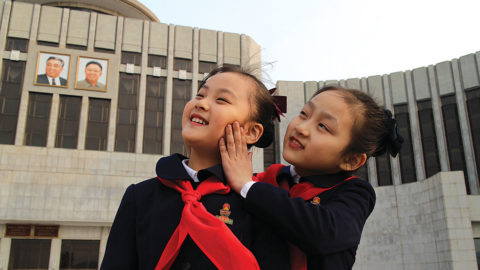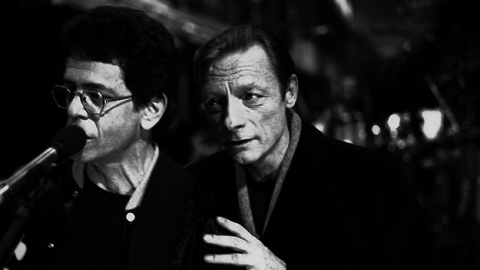Interview: Vitaly Mansky
Though the Ukrainian-born Vitaly Mansky has been making documentary films for two decades, it’s only in recent years that his work has traveled beyond festivals held in Russia or the former Soviet bloc. In 2013 he won prizes at the London and Karlovy Vary film festivals with Pipeline, which followed the Trans-Siberian pipeline through a diversity of villages and enclaves en route, and then in 2015 he detonated a doozy in international waters with Under the Sun, in which he collaborated with the North Korean government on a scripted documentary that pleased neither the North Koreans nor his home country. Mansky’s method was to let his hosts dictate how, when, and with whom to make the film, while letting the footage around the edges of the highly planned shoot—the moments before and after “action” and “cut,” and the seemingly innocent cutaways and B-roll—suggest commentary, perspective, and a subtle but significant sense of self-identification by the filmmaker. At first it plays as satire, but by the end it feels like a lament. The film was critically well received in the States, and enjoyed a run at New York’s Film Forum.
Unlike compatriots who’ve had to engage the region’s politics from places of chosen or forced exile, Mansky has long done so from within—until now. After helping to found the independent and influential Artdocfest in 2007, and after enduring state defunding efforts in part targeted at the director, Mansky moved shop to the Riga International Film Festival. And as recounted in his new film Close Relations (Rodnye), the filmmaker has had to grapple with the conflicted feelings and loyalties of being born in the Soviet Union, raised in the Ukraine, educated and developed into an artist in Russia, and ultimately left stranded by recent events. The film recounts a year in which he visits with members of his extended family throughout the Ukraine, taking stock of a wide spectrum of experiences and political affiliations, and watching the fractious country descend into conflict and war.
In this interview conducted during his visit to the Toronto International Film Festival last year for the film’s premiere, Mansky discusses his process of formal discovery and flexibility, and how he approached his family as subjects and navigated putting himself on screen despite misgivings. Close Relations begins a theatrical run today at Museum of the Moving Image.
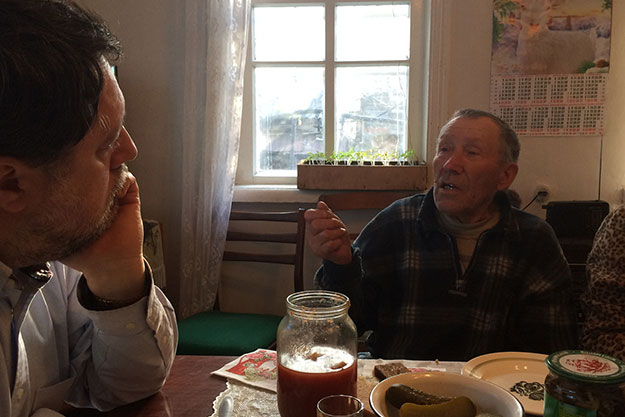
Mansky during the filming of Close Relations
I wasn’t familiar with your work until Under the Sun, and that film is so formally different from this new one, Close Relations. Would you say this is typical for your method, to veer between modes of storytelling from one project to the next?
I know that in terms of style, there are some who prefer to create films that are similar. They may have different topics, different subjects, but they’re all stylistically the same film. That’s not how I work. For me, each film is new—I start from a blank page. And so I like to think that every film that I make is different. Each story requires its own approach, its own tone, its own feeling. In life we can’t always be either happy or sad, and film is a representation of us and how we feel. And so I feel that this film reflects my state of mind and my feeling for this story, for this topic. North Korea is a very different story. It feels different, and so it looks different. This film starts with the phrase, “I never thought that I’d be making this film.” The statement is a very honest one, and it’s also accurate to say that this film was made without a plan. It was very much an unpredictable project as it went along. I’m going to say this for the first time: I’d give so much to never have this film in my life, to have none of the events in this film in my life, and so I feel a lot of sorrow for the existence of this film and its events.
Sorrow in relation to your family members? Or sorrow in terms of what everyone is going through in the Ukraine?
Everything that happened. The annexation of Crimea, the thousands of dead young men in Donbass, the fact that I left my home and went to a different country. Everything altogether.
There’s such weight behind your saying you wish that this movie didn’t exist. Had you been filming your family before you thought of this as a movie, or did you embark on this as a necessary if painful project?
When I saw that Russia was annexing Crimea and beginning the annexation of other regions in Ukraine, there are two things that I understood. The first is I need to be close to my family and the people close to me, and the second is that I need to be able to tell this story to explain to a larger audience what’s happening in the Ukraine. I can’t continue to live in a country that takes these kinds of actions. But when I began making this film, there weren’t casualties in this conflict. I didn’t know how events would unfold. And maybe that’s the key role of the documentary filmmaker, to come into an event open to the unfolding of that event, as opposed to with your own, ready script.
You’re open to things as they happen, and yet you’re also looking for things that you can use in the film. How did you balance being present with your family members with needing to have the camera ready, to composing shots and sequences?
One of the biggest challenges was to give the people close to me the opportunity to be themselves, to say what they say, to be who they are. Not to try to convince them, or to change their mind. That was one of the biggest challenges for me personally.
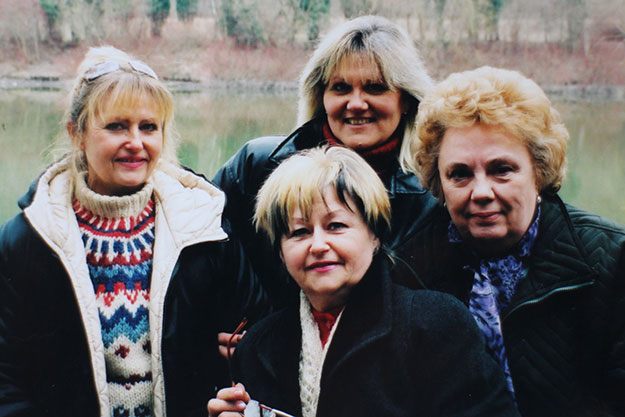
Close Relations
I would imagine it was hard not to argue—that’s what families do.
Especially for those who are on the pro-Russia side. I know Russia very well. I had damning arguments in order to disarm the things that they were saying. But I wanted the film to be as honest, as open, and to present as many conflicting viewpoints as possible, so I had to present them as they are, uncorrected. The most difficult thing is to work with the people who are closest to you. We’ve all seen movies about families. And sometimes it’s very uncomfortable for me as an audience member to watch as people on the big screen perform their relationships. And so I thought a lot about how, for example, do I speak to my mother? Whenever I filmed my mother, I actually always spoke to her from the next room. I wanted to help my mother to be herself. If we were sitting next to each other, it would have been this sunny story about a mother and a son who interview each other. But it would have been a performance.
You couldn’t have someone else—the cameraperson or another crewmember—interview her?
It was always me. And by the way, I didn’t want to be on screen in the movie. Those moments when I do appear in the film, those were more technical considerations when I would come into the film to create a more comfortable atmosphere. And when I was editing the film, I fought with myself. I don’t like seeing directors in their own films, especially when they’re wearing white pants! But it seemed to me that at certain moments, I had to be there. And to repeat myself: it wasn’t planned.
You weren’t making yourself into a character, you had to be there.
I don’t trust directors that are in their own films. For me, those films are immediately over once I see a director.
So you’re on the edge here of being untrustworthy to yourself. Also at the edge of things is the war, which is never featured or even literally shown, yet it’s constantly there. That’s not an easy thing to capture—the absence of the thing that’s actually the most important thing.
I’ve spent three months in a real war, the one between Armenia and Azerbaijan during the 1990s. And I know that war isn’t people shooting off cannons and running with rifles. That’s not it. War is when you wake up in the morning and they tell you that overnight they killed three people.
During the course of the film, you take us from people conjecturing about combat, about the potential for loss of life, to experiencing it.
It was a big risk for me to edit the movie that way. But that’s how it happened. We go from a clip of a person saying, “The war is going to be over soon,” to 10 minutes later the Boeing airplane comes down and you realize the conflict is just beginning. That’s the harshest dramatic, or dramaturgical, challenge of life. In essence, the film becomes a direct translation, a livestream of the war and of life. When Putin received the right to send troops into Ukraine, I thought this could be the beginning of another world war. It felt like standing on the precipice of another world war. This film was born in that moment. I was in Spain, and accidentally, coincidentally, I turned on the TV to a report from the Russian parliament. “Who’s in favor of allowing Putin to use military force in the territory of other countries? Raise your hand.” And everybody raised their hand. “Who’s against? Who abstains?” Nothing. It took 30 seconds. And in those 30 seconds I decided to move to another country to start making this film, and to start a new life. Or a different life.
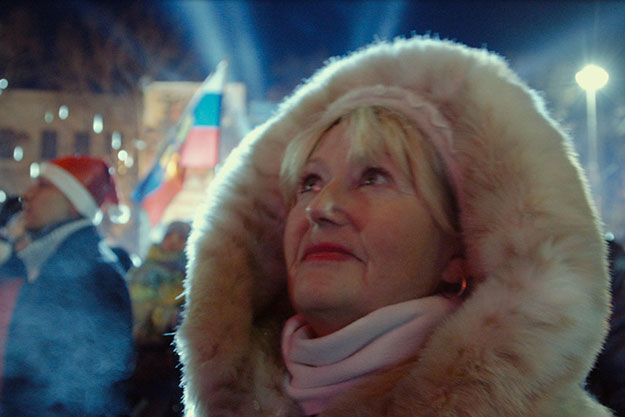
Close Relations
You were talking about how you don’t like when filmmakers put themselves on screen, but this is clearly such a personal film in every way. I also saw Under the Sun as being a deeply personal film. I don’t mean to presume to know you or your intentions, but I felt like you were presenting us with a mirror of you own experiences growing up in the Soviet Union.
If a director doesn’t make a personal film, he shouldn’t be making films.
Yet I don’t know that I’ve ever seen a film so successfully compel me into thinking that an outward gaze onto a foreign land was actually an inward, even private one.
I was born in the Soviet Union. I was at the funeral of the Soviet Union. I know very well what a totalitarian system is. I can feel subconsciously, or I can just feel it in my bones, when a totalitarian system seems to be on the rise. I can sense it. I can sense the start of that wind, that earthquake that will happen tomorrow. And so when I made a film in North Korea, I’m making a film about how totalitarianism in my country is coming out of its grave.
Where you personally arrive in Under the Sun, feeling so disenchanted with your homeland and your past, is incredibly powerful. Where has it led you, since you stopped filming?
I live in Latvia now, in Riga. I’m starting a new life.
It can’t have been easy to do that.
After 50 years, no, that’s not easy.
What’s motivating you in this new life?
I don’t have a very optimistic outlook. But we’re not the ones writing the screenplay. [Laughs]
Will you return to either Ukraine or Russia, either to work or visit family?
I lived in Ukraine until I was 18 years old. I finished school there, then left and went to study in Moscow, and stayed in Russia. I am responsible for the biggest documentary film festival in Russia [Artdocfest]. Russia is doing everything to destroy this festival, and with each year, that’s the reason why the festival becomes stronger and bigger and better. It’s one of the paradoxes of Russian life. In Russia, nothing can be “thanks to.” In Russia, everything has to be “in spite of.” For those audiences, we are like their only window into the world. We show movies, and then the government sues us for showing those films, and then we continue to show those films.
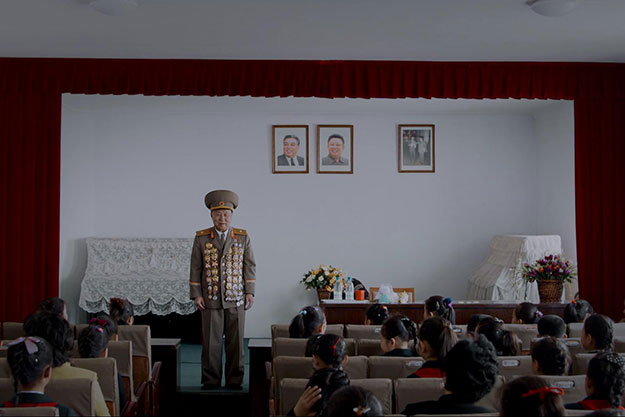
Under the Sun
In America, there’s sometimes too clear a separation between those making political or issue-oriented films and those who think about the craft, and think about what they’re doing as art. Judging just from these two extremely different films, you clearly don’t make these distinctions.
In true film, you can’t have subject without the art form, and the art form without the subject. Film should reflect not an inner world, but an inner energy. When I watch a movie, I want to understand who made it. What is he thinking about? Even if it’s a movie about, I don’t know, animals, I want to understand. And I think that my films reflect me. That’s what I’d like to think. Because I’m not a neutral individual, I get very involved in topics. I don’t live in America, but I’m deeply concerned who’s going to be president. Even though it shouldn’t make a difference to me. There are people who don’t care, and that’s fine too. But if you’re an artist, I want to be able to see in your film—is this important to you or not?
I remember attending an independent film festival in Moscow, years ago, when we had to wait several hours for the start of a film because the print was being driven over the border, in what was probably the only screening of that film in the country. I loved the film, which was a harsh satire of how things were going in the country, but even if I didn’t, it was one of the most significant screenings of my life. It felt incredibly vital, just being able to watch the movie.
Everything has a beginning. An illness that will kill you begins somewhere; you don’t die right away. First you get a cold, a runny nose, then it gets into your lungs, and then you die. If you treat that runny nose right away, maybe you don’t have to die. In Russia—Under the Sun is not shown in Russia. They’re afraid of it. People write, “We love you, it’s a fantastic film, but we’re afraid to show it.” They don’t even say it over the phone—they write it down. That’s why death is close.
In this film, the parallels between North Korea and Russia are in the subtext. If subtext is too much…
During the Soviet Union, the constitution said, “This is a dictatorship.” Now we live in a country where in the constitution says, “This is a free country.” Any lack of freedom is against the law. It’s a paradoxical thing.
It’s against the law, but everyone knows that the law doesn’t mean what it says.
You’re free, I’m free, but nope. If you remove a person’s spine, then you’re not a person anymore. And if you remove a person’s freedom, you’re also not a person anymore. Because what is freedom? It’s not tangible. But without it, there’s no life. We think that we’re living, but we’re not.
Eric Hynes is a journalist and critic, and associate film curator at Museum of the Moving Image in New York.



